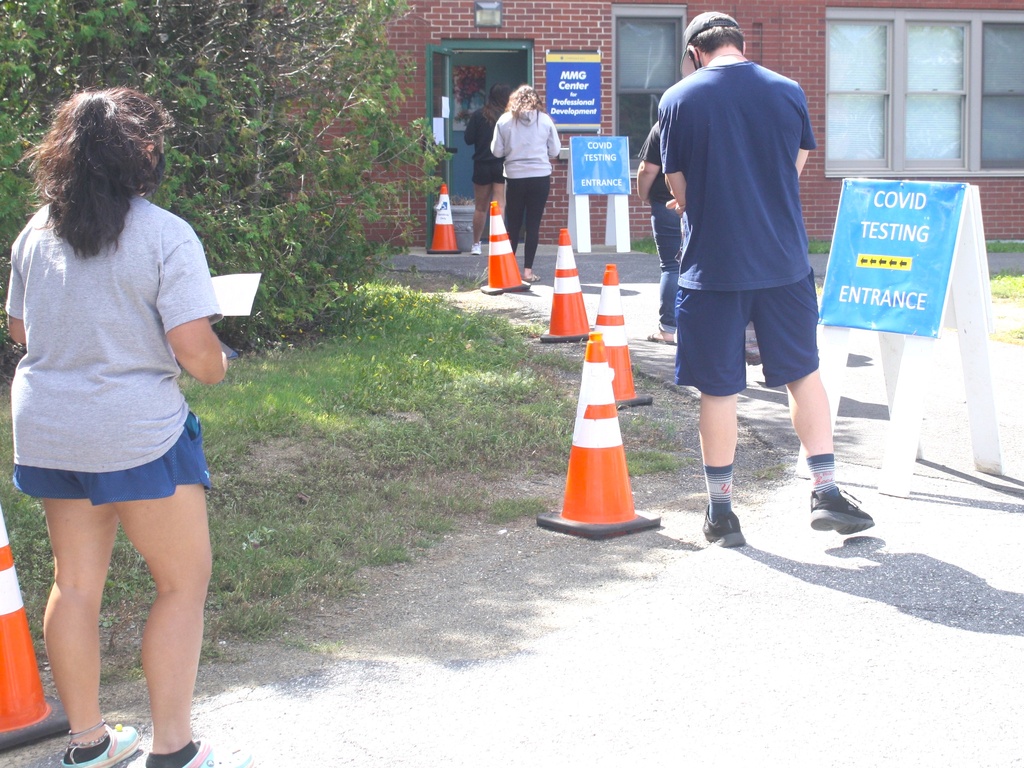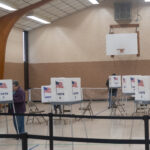
PRESQUE ISLE, Maine — Dozens of students donning face masks waited in a long, socially distanced line as each was tested for COVID-19 at the University of Maine at Presque Isle’s campus on Friday, Aug. 28. The students then were sent off to their dorms, required to quarantine as they await the results.
It was far from a conventional move-in day for UMPI’s student body. Yet, most were just appreciative of returning to campus, an element of normalcy in a year that has been anything but.
As colleges across the country deal with issues arising from the COVID-19 pandemic — including several outbreaks — policies UMPI employs to contain the virus are of vital importance for students and the greater Presque Isle community. Compared to other universities, those ramifications are especially high on UMPI’s campus, located in a community with far less hospital capacity than several of the University of Maine System’s more urban campuses.
Students have hardly been on campus since UMPI halted in-person classes at the beginning of the COVID-19 pandemic in March. Face-to-face instruction will return this year, with students deciding how many credits they want to do in person based on educational and personal needs. UMPI President Raymond Rice estimated that 40 percent of students would do all online courses, 20 to 30 percent all in-person, and the rest a combination.
Several new guidelines will be in place for the semester. All out-of-state and residence hall students were required to take COVID-19 tests upon arriving on campus. No matter what their results are this round, the same students will be tested again in about 7-10 days to ensure the first test didn’t miss anything. Groups of students will continue to be tested throughout the year to ensure rates aren’t increasing, Rice said.
Students will be required to wear face masks and social distance on campus and be expected to do the same when off-campus. Those who don’t follow the rules risk harsh penalties such as suspension or expulsion.
University of Maine System Chancellor Dannel Malloy said the guidelines would allow the university to ensure that no one is bringing the virus to campus. He said he was particularly assured of the safety of UMPI and the University of Maine at Fort Kent students because of the high number of students from The County, a region with few coronavirus cases.

Students from the University of Maine at Presque Isle wait to get take a COVID-19 test on move-in day on Friday, Aug. 28.
Staff Photo/David Marino Jr.
As of Monday, the Maine Center for Disease Control and Prevention said there were three active COVID-19 cases in Aroostook County.
“We know how low the numbers are in The County — it’s extraordinarily low,” Malloy said.
“We don’t believe we’ll be responsible for the introduction of large amounts of the virus, if any.”
Malloy said he had made it clear to students that this will be a semester like few others. While students will receive the education they expect from the University of Maine System, there would be no way to ensure that higher education would be close to the same as past years until a medical breakthrough.
“I’m not in a situation to guarantee a whole lot in a year of COVID,” Malloy said. “I think we’ll see normalcy returned when there’s a vaccination available.”
UMPI Associate Dean of Students Sarah Coyer said she would begin the year doing what she had always done: trying to ensure the safety of students. But with large meetings off-limits, the most sizable new obstacle will be maintaining communication lines with students she will hardly interact with face-to-face.
College administrators have long been required to address the dangers presented by student parties, from underage drinking to sexual assault. With the pandemic, such large gatherings also risk spreading the virus. Malloy said violations would be punished severely — last week, the University of Maine disciplined eight students for violating rules on such gatherings.
Coyer said that UMPI students understand the health ramifications of unlawful gatherings. They are aware of the risks presented by any outbreak: evacuation from the dorms and a return to entirely online learning.
“The response that I’ve gotten from our students has been so positive and supportive,” Coyer said. “I even have students who enjoy parties that have told me ‘Sarah, I will tattle this year.’”
Rice said he was happy to be on campus, but that the virus brings many new potential sources of worry. He was pleased that after about 100 tests, there had yet to be any positive cases — as of Sunday, Aug. 30, that continues to be the case on UMPI’s campus.
He said the most sizable change to the classroom experience would be teachers’ loss of the “immediate feedback loop” from students’ faces as they wear facemasks. Yet, he said faculty had done several workshops over the last few weeks to accommodate changes.
Despite the restrictive new circumstances, Rice said several enrollment numbers were positive for UMPI: enrollment was up 6 percent at 1,081 students, the largest number they’ve had in many years. Additionally, out-of-state transfer students are up 30 percent.
“The population of Maine continues to decline,” Rice said. “So it shows that our reputation is really reaching well beyond the state of Maine.”
UMPI student Miranda Cole of Presque Isle, a junior majoring in fine arts, said she was excited to see her friends again after a long absence, though she knew it would be with new safety protocols.
Cole — who will be living on campus for the first time this year — said that the mask requirement and other rules were necessary to keep everybody safe, especially because many students had family members who presented increased health risks if they contracted COVID-19.
“It’s just one of those things you have to get used to,” Cole said. “You’ve got to be considerate of other people.”




